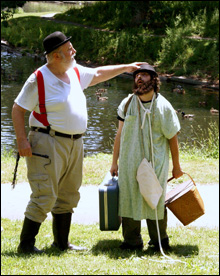
STRIVING TO SEE And be seen, in Waiting for Godot. |
Samuel Beckett's masterpiece, the tragicomedy Waiting for Godot, might not be everybody's idea of a summertime al fresco romp. And yet how entertainingly it plays amid the trees and waterways of Deering Oaks Park, whilst theater-goers clandestinely toss back some cold ones. It is a pleasure not to be missed, and we have it because Fenix Theatre Company, by now well loved for their free outdoor Shakespearean fare, has opted this season to produce a second, non-Bard classic in repertory with Love's Labor's Lost. At the base of a steep little bowl on the edge of the walkway around the pond, Rob Cameron directs a deeply poignant production that is also — as it should be — a gas.
>> READ: "Review: Love's Labor's Lost with Fenix Theatre Company" by Megan Grumbling <<
That's right: Though Godot is indeed a brooding Existentialist treatise on the human condition, it is also a rough-and-tumble slapstick comedy laced with verbal wit of the first order. If you know it only by reputation, or have suffered through a painful, interminable production of it, rest assured that this show is fun, fleetly paced, beautifully acted, and only about two hours long (the script has been cut — of necessity, but I did mourn some of the excised bits). As the bowler-hatted tramps Vladimir (Matt Delamater) and Estragon (Bryant Mason) endlessly await their mysterious appointment, they skirmish, pose and tumble in classic vaudevillian fashion, and pass the time with hat tricks and insult competitions (the winning barb, famously, being "critic" — worse even than "sewer-rat" and "abortion"). As the more dominant and masculine of the two ever-quarreling companions, Delamater has an old-timey showman's charisma, and he and Mason have all kinds of physical fun, clinging and teetering and shaking their bellies around the single tree that is the characters' only written set piece.
A diversion for Didi and Gogo (as they call each other) comes in the absurdist comedy of whip-wielding narcissist Pozzo (David Butler) and his tethered "carrier," Lucky (Johnny Speckman), who are just passing through. The bizarreness of their master-slave relationship is amplified by the jock-strap Pozzo wears over his pants (so that in his suspenders he looks a big-bellied droog from A Clockwork Orange) and by Speckman's pale green dress, vacant gaze, and scarily overgrown facial hair.
Speckman's zombie-like presence is perfect in its funny-disturbing way, though his big "thinking" monologue could use a little more crescendo, and Butler is masterful in Pozzo's booming monologues, as he alternately philosophizes about twilight and abuses his slave. Butler's jocular, out-sized comedy is hilarious (particularly each time Pozzo succeeds, to his immense satisfaction, of seating himself on a tiny stool) but he conveys man's profound anxiety. When he returns with Lucky the next day, now blind and remembering nothing of the two of them, and Vladimir demands to know when he was blinded, Pozzo's pained fury at the question of time is heart-stopping.